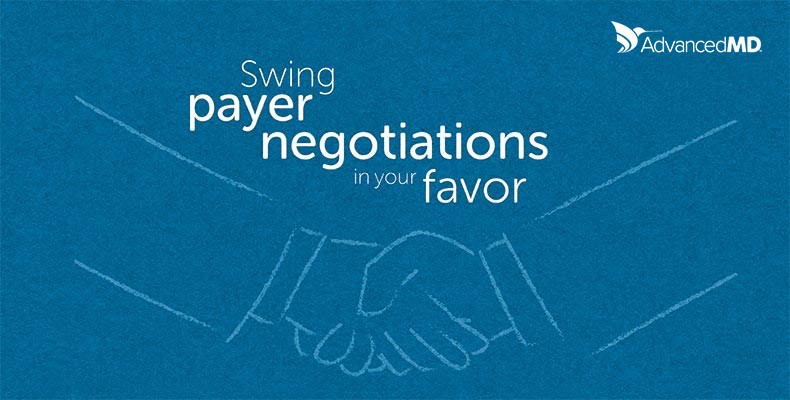
You may have noticed there has been a lot of buzz around payer contract negotiations lately, and for good reason. New mandates, healthcare exchanges, and higher co-pays/deductibles are making it more difficult than ever for the private-practice physician to get paid.
Although the idea of going head-to-head with large health plans can often cause the small medical practice to begrudgingly accept terms as the payer presents them, putting forth the effort can lead to higher financial performance that is sustainable year over year.
Read on for 5 tips to swing payer negotiations in your favor.
#1 Start with a plan
No private practice should approach payer negotiations haphazardly; develop a strategy on how you will handle them to increase your odds of getting what you want.
Set a schedule. In a busy private practice, it can be easy to overlook the start or end date of payer contracts. However, when you have time to properly negotiate, you are more likely to get favorable terms. Develop a calendar that gives you enough leadtime (up to 150 days) to bargain with health plans.
Appoint a point person. It’s important that you select a team member to lead your payer-negotiation efforts. This will streamline the process and prevent any miscommunication to the payer. Be sure this person understands the key negotiating points and the lines in the sand.
Write down your “ideal” terms. Although you are unlikely to get everything exactly as you want it, it’s a good idea to clearly identify your perfect-world terms and work from there. Remember to evaluate all aspects of the contract including pre-authorization waivers, submission deadlines, fee schedules, referral stipulations, and termination procedures.
#2 Review the key terms
Closely scrutinize the primary terms of the healthcare payer agreement. Some physicians sign the contract “as-is”, but most payers have wiggle room to negotiate. Key terms to consider:
Reimbursement schedule. This is the meat of your agreement: You need to know what the health plan will pay you. Be sure that the fee schedule is clearly outlined, and never sign a contract if one is not included.
Check the deadlines. There are two primary deadlines to look for: The filing deadline (the time you have to submit the claim after the patient visit) and the payment deadline (the time the plan has to pay you after they receive the claim). Missing payer deadlines is a large revenue leak for many independent practices, so take the time to review the deadline schedule carefully. When it comes to filing deadlines, health plans are all across the board with some payers allowing up to 365 days for submission, others as little as 90 days.
Dispute process. It’s an unfortunate reality that you will most likely need to dispute a claim with your payer; you need to understand the contractual procedures to resolve these denials. Some plans may have an appeal process that will cost you more than the payment in question, not to mention long turnaround time that disrupts cash flow. If the dispute process looks too cumbersome, it could foreshadow revenue loss with this payer.
#3 Don’t overlook the “hidden” terms
Once you know the primary terms of your contract, it is time to dig a little deeper. There are “hidden” terms in most payer contracts that are often overlooked by small independent practices. Skipping over these can bust your bottom line. Ask these questions to uncover hidden terms:
- How is the fee schedule calculated & how often is it updated?
- Will you be charged for referring patients to out-of-network providers?
- What is the early termination fee if you want out of your contract?
- Can pre-authorization requirements be waived in certain situations?
- Are contract amendments unilateral or do they have to be accepted by both parties?
- How will amendment notifications be made?
#4 Provide data, lots of it
The best negotiation efforts can be futile if you don’t have the numbers to back you up. Private practices that present data during payer negotiations tend to reap the rewards for their preparation—as much as 3-10%. When preparing, consider any and all ways how the health plan has benefited from your quality care of their patients.
- How much business did you & the payer do together in previous years?
- What are your quality metrics & patient satisfaction scores?
- How do you rate against the competition in your area & in your specialty?
- How do you limit ancillary costs?
- Were you able to prevent costly hospital admission or readmission?
#5 Plan for next year
Negotiating with payers isn’t an easy business. If after some intense bargaining you decide to accept the payer’s terms, it doesn’t mean that there isn’t room to getter a better agreement in the future. Additionally, each time you negotiate a contract you’re likely to get a little better at it. Also, you now know what data to gather before the next agreement cycle. Set your eyes on next year and approach the negotiations better prepared.

